 The summer of 2011 is over, a new school year has started, everyone has finally unpacked their camp bags, and now the wait for the summer of 2012 begins. Ten months isn’t really that long. Every year we manage to wait it out. But when it’s September and the fun times we had this past summer are still fresh in our minds, it seems like an eternity; and, inevitably, we all feel a little bit (or a lot!) camp sick. We all know the feeling. Some of us find ourselves singing camp songs or have the urge to tie-dye something…maybe even set our ring tones to the camp bell, or just sit around with camp friends re-living all of the memories from the summer. Saying goodbye to another summer in our own way is a rite that we go through every fall. We not only say goodbye to our camp friends, but our counselors, and upper campers. But on the upside of goodbye is hello. Hello to all of our new friends who will join us for the first time next summer. Hello to the challenge and excitement of planning a new summer that’s even better than last. Hello to good times that turn into new memories. Hello to a new group of campers. Hello to the new counselors and staff members who choose to make camp their summer home next year. Hello, everyone. We can’t wait to see you in the summer of 2012!
The summer of 2011 is over, a new school year has started, everyone has finally unpacked their camp bags, and now the wait for the summer of 2012 begins. Ten months isn’t really that long. Every year we manage to wait it out. But when it’s September and the fun times we had this past summer are still fresh in our minds, it seems like an eternity; and, inevitably, we all feel a little bit (or a lot!) camp sick. We all know the feeling. Some of us find ourselves singing camp songs or have the urge to tie-dye something…maybe even set our ring tones to the camp bell, or just sit around with camp friends re-living all of the memories from the summer. Saying goodbye to another summer in our own way is a rite that we go through every fall. We not only say goodbye to our camp friends, but our counselors, and upper campers. But on the upside of goodbye is hello. Hello to all of our new friends who will join us for the first time next summer. Hello to the challenge and excitement of planning a new summer that’s even better than last. Hello to good times that turn into new memories. Hello to a new group of campers. Hello to the new counselors and staff members who choose to make camp their summer home next year. Hello, everyone. We can’t wait to see you in the summer of 2012!
Tag: summer camp 2011
Sing, Sing a Song
 There is something about singing that brings people together. Perhaps that’s why singing (and music in general) is such an important part of camp. The silly or sometimes sentimental words of a “camp song” can set a mood, evoke a feeling, and create atmosphere. Music is a universal language that everyone understands. Perhaps this is why so many American summer camps open and close their summers with sing-alongs. Sing-alongs are fantastic ways to say both “we’re together again” and “until next time.”
There is something about singing that brings people together. Perhaps that’s why singing (and music in general) is such an important part of camp. The silly or sometimes sentimental words of a “camp song” can set a mood, evoke a feeling, and create atmosphere. Music is a universal language that everyone understands. Perhaps this is why so many American summer camps open and close their summers with sing-alongs. Sing-alongs are fantastic ways to say both “we’re together again” and “until next time.”
Ask campers to name some of their most favorite moments of summer camp and, most assuredly,  they’ll name more than one that involves singing in some way…that first exciting night of camp, campfires, zany and often spontaneous dining room rituals, fun times with fellow campers and counselors inside the bunk, and saying goodbye at the end of the summer. More importantly, ask any current or former camper to sing his camp alma mater and he’ll do it as if it’s second nature. The words of a camp’s alma mater are magical—a way to instantly transport one back to camp and those summers filled with fun and friends.
they’ll name more than one that involves singing in some way…that first exciting night of camp, campfires, zany and often spontaneous dining room rituals, fun times with fellow campers and counselors inside the bunk, and saying goodbye at the end of the summer. More importantly, ask any current or former camper to sing his camp alma mater and he’ll do it as if it’s second nature. The words of a camp’s alma mater are magical—a way to instantly transport one back to camp and those summers filled with fun and friends.
Many parents say that their children even sing camp songs constantly throughout the winter as a way of remembering their time at camp. Some of them even admit that they can’t resist the temptation to join in.
Crazy Days and Whacky Nights
 Parents, do you ever log onto your computer to check out the camp photos for the day, see your child painted in blue from head to toe or maybe wearing a crazy wig and big nerdy glasses and wonder, ‘What in the world?’ The answer probably has something to do with your summer camp’s special events and evening activities. For fifty plus nights (and some days) summer camps entertain your children with some of the zaniest games and wackiest contests that they can come up with. Why? Because it’s fun to be painted in blue from head to toe…seriously. Or at least it is when your cabin is performing a dance to the Smurfs theme in front of the entire camp and you’re Papa Smurf—or Smurfette. And seeing images of your children and their counselors slipping, sliding, and splashing around in what appears to be multi-colored goo…it’s a camp thing…a really fun camp thing. Eye patches are always fun. So is spending a day pretending to be pirates and searching for buried treasure. Becoming a secret agent and collecting clues to decode a message or pretending to be wild animals is also a great way to spend that occasional non-program day. From trivia contests to talent contests and everything in between, some of the greatest moments of summer camp happen during the crazy days and wacky nights!
Parents, do you ever log onto your computer to check out the camp photos for the day, see your child painted in blue from head to toe or maybe wearing a crazy wig and big nerdy glasses and wonder, ‘What in the world?’ The answer probably has something to do with your summer camp’s special events and evening activities. For fifty plus nights (and some days) summer camps entertain your children with some of the zaniest games and wackiest contests that they can come up with. Why? Because it’s fun to be painted in blue from head to toe…seriously. Or at least it is when your cabin is performing a dance to the Smurfs theme in front of the entire camp and you’re Papa Smurf—or Smurfette. And seeing images of your children and their counselors slipping, sliding, and splashing around in what appears to be multi-colored goo…it’s a camp thing…a really fun camp thing. Eye patches are always fun. So is spending a day pretending to be pirates and searching for buried treasure. Becoming a secret agent and collecting clues to decode a message or pretending to be wild animals is also a great way to spend that occasional non-program day. From trivia contests to talent contests and everything in between, some of the greatest moments of summer camp happen during the crazy days and wacky nights!
Going Gaga for Ga-Ga
 Something you might not know about summer camp: It breeds passionate athletes in many different sports, even ones that are little known outside of summer camp, such as ga-ga. Although it’s not well known in America (but becoming more so everyday!), hoards of campers dream all winter about getting back into the ga-ga pit. Many camps even have ga-ga tournaments! Camp challenge weeks even have ga-ga challenges. There is no doubt that campers are going gaga for ga-ga!
Something you might not know about summer camp: It breeds passionate athletes in many different sports, even ones that are little known outside of summer camp, such as ga-ga. Although it’s not well known in America (but becoming more so everyday!), hoards of campers dream all winter about getting back into the ga-ga pit. Many camps even have ga-ga tournaments! Camp challenge weeks even have ga-ga challenges. There is no doubt that campers are going gaga for ga-ga!
So what is this ga-ga? It’s a little like dodgeball in a circular enclosed space. Many camps feature ga-ga  pits , but the game can be played virtually anywhere there are four walls or barriers. As in dodgeball, when players are hit with the ball, they are out. They may, however, use the walls of the ga-ga court to clear the ball. As players are struck by the ball, they are eliminated, and leave the pit. The last boy (or girl) standing wins. Two primary ways that ga-ga differs from dodgeball is that ga-ga strikes must be at or below the knees and players bounce rather than throw the ball. Also unlike dodgeball, players may either bounce the ball at other players or against the walls of the pit. Some camps have adopted rules of play unique to their campers’ style of ga-ga play, while others prefer to stick to the official rules…What? There are official rules? Yep. In fact, there is even an International Championship Tournament held annually in Europe. More than 30 countries , including the U.S., winner of multiple championship titles, participate.
pits , but the game can be played virtually anywhere there are four walls or barriers. As in dodgeball, when players are hit with the ball, they are out. They may, however, use the walls of the ga-ga court to clear the ball. As players are struck by the ball, they are eliminated, and leave the pit. The last boy (or girl) standing wins. Two primary ways that ga-ga differs from dodgeball is that ga-ga strikes must be at or below the knees and players bounce rather than throw the ball. Also unlike dodgeball, players may either bounce the ball at other players or against the walls of the pit. Some camps have adopted rules of play unique to their campers’ style of ga-ga play, while others prefer to stick to the official rules…What? There are official rules? Yep. In fact, there is even an International Championship Tournament held annually in Europe. More than 30 countries , including the U.S., winner of multiple championship titles, participate.
No one quite knows how ga-ga originated or where it comes from, but rumor has it that the game gets its name from the sound the ball makes during the opening play. It’s bounced twice in the air and the players say “ga” on each bounce. On the third bounce, the ball is in play (some rules call for three bounces with the ball officially in play on the fourth bounce). So warm up your ga-ga hands and start stretching. We’ll see you in the pit!
Got Communication?
 Parents: Camp is near. You’re packing bags, making last minute preparations, and listening to endless stories with increasing enthusiasm about what happened during the summer of 2010 in eager anticipation for summer of 2011 to begin. You’re checking and re-checking to make sure all of the paperwork has been submitted and the bag pickups have been scheduled. So we figure now is the perfect time to talk about the importance of maintaining good communication with your Camp Directors—now and throughout the summer.
Parents: Camp is near. You’re packing bags, making last minute preparations, and listening to endless stories with increasing enthusiasm about what happened during the summer of 2010 in eager anticipation for summer of 2011 to begin. You’re checking and re-checking to make sure all of the paperwork has been submitted and the bag pickups have been scheduled. So we figure now is the perfect time to talk about the importance of maintaining good communication with your Camp Directors—now and throughout the summer.
Camp is a big deal for your children and for you. Whether you’ve planned a quiet summer at home or have an awesome vacation planned, we know that your top priority is to know that your children are having an amazing summer. You can help, simply by being informative.
 We’re first and foremost concerned for your child’s safety and well being. Some of you probably wonder why we ask for photos of your children prior to camp. It’s so that we can show them to your children’s counselors when we discuss your children’s activity preferences with them so that they can greet campers by name from the moment they step off the bus and have full knowledge of how to make their summer successful.
We’re first and foremost concerned for your child’s safety and well being. Some of you probably wonder why we ask for photos of your children prior to camp. It’s so that we can show them to your children’s counselors when we discuss your children’s activity preferences with them so that they can greet campers by name from the moment they step off the bus and have full knowledge of how to make their summer successful.
We can’t emphasize enough the importance of communicating medical issues. Whether it’s an allergy to certain foods or insects, perhaps a dietary restriction, asthma, a vitamin deficiency, or wetting the bed, your camp directors need to know so that these matters can be handled appropriately as situations relating to them may occur throughout the summer.
We also want to know what your children’s interests are. If we know your child can’t get enough soccer, for instance, we can make sure that he/she gets maximum exposure to soccer during the summer. Knowing what your children like only helps us guarantee they have the summer of a lifetime.
 Personal family matters are never easy, but if there is something happening at home—a divorce, illness in the family, academic issues, etc. it helps us to know. Perhaps it’s a positive development. Your child has landed a new role in a film, has made a particularly competitive athletic team, has earned a special honor at school. Whatever IS your children’s lives at the moment they come to camp, we want to be able to channel it into an amazing summer for them. And we’re confident we can. Otherwise, we wouldn’t ask. As your child’s “summer family”, we want to know how we can help them be at their best.
Personal family matters are never easy, but if there is something happening at home—a divorce, illness in the family, academic issues, etc. it helps us to know. Perhaps it’s a positive development. Your child has landed a new role in a film, has made a particularly competitive athletic team, has earned a special honor at school. Whatever IS your children’s lives at the moment they come to camp, we want to be able to channel it into an amazing summer for them. And we’re confident we can. Otherwise, we wouldn’t ask. As your child’s “summer family”, we want to know how we can help them be at their best.
 If anything comes up between the time you put your child on the bus or plane to come to camp and the time we put them back on the bus or plane to come home that might affect his or her summer, please call us. We want to know what’s happening. We want to understand how we can make your child’s stay at our camp effortless and memorable. Even if it’s minor, if you have any reason for pause, please call us. We want to be proactive in making your child’s experience memorable.
If anything comes up between the time you put your child on the bus or plane to come to camp and the time we put them back on the bus or plane to come home that might affect his or her summer, please call us. We want to know what’s happening. We want to understand how we can make your child’s stay at our camp effortless and memorable. Even if it’s minor, if you have any reason for pause, please call us. We want to be proactive in making your child’s experience memorable.
Lots of Fun During Staff Orientation!
Staff Orientation is in full swing! All our staff is at camp learning the ins-and-outs of being a camp counselor and having a blast. It’s certainly a talented crew! We’ve had a jam-packed week so far with Leadership Training Sessions, Health and Safety Seminars, Typical Day At Camp, Role Playing, Staff Chaos, Campus Competes, Field Night, CL Drafts, Swim Tests, Driving Tests and so much more. We even brought in Maine’s premier Square Dance Caller, Al Hipkins, for a little Hoe-Down last night. Yeehaw! We still have a lot to do before camper arrival day on Saturday but we can’t wait. Only 5 days till camp!!!
10 Things to Do before Your Children Leave for Summer Camp
10 Things to Do before Your Children Leave for
10. Complete all of the camp paperwork. This provides the camp with valuable details about your child that they can pass onto their health center and counselors. Knowing your children’s interests before they arrive helps the camp place them into cabins or bunks in which they’ll thrive, provide them with the best program options, and be able to supply them with any medication they may require.
9. Buy stationary, pre-address and stamp envelopes for letters home. Many camps have specific time set aside in their daily schedules for writing home. Pre-addressed envelopes help ease the process of sending the letters campers have so lovingly written. This is particularly the case for younger campers. Also, familiarize yourself with your children’s camp policy regarding camp packages to avoid disappointment that may result from sending items that are undeliverable to your children.
8. Review the camp’s packing list and make sure you have everything. Don’t overlook things like extra socks and underwear as well as rain gear and warm clothing.
7. Review your camp’s handbook with your children. Camp handbooks contain valuable information regarding the expectations of campers. Emphasize that camps put such guidelines in place for the safety and well being of their campers so that they can insure everyone has the most fun possible.

5. Make sure your children’s camper accounts are in order. Some camps maintain “spending accounts” for campers. These accounts provide additional funds for campers to take along on out of camp trips to purchase souvenirs or treats. If you’re unclear at all, call the camp office. Keep in mind that these are often separate accounts from those that cover in-camp expenses such as canteen and laundry services.

 3. Pack. It sounds so simple. Yet, for camp, it’s quite the production. Most camps strongly advise against packing any clothing that can’t withstand commercial laundry services. It’s also wise to remember that camps often downplay the importance of physical appearance, which means leaving the “dry clean only” and “one of kind” items at home is typically a good idea. Once you have your children’s bags packed, don’t forget to arrange for them to be delivered to camp by the designated date.
3. Pack. It sounds so simple. Yet, for camp, it’s quite the production. Most camps strongly advise against packing any clothing that can’t withstand commercial laundry services. It’s also wise to remember that camps often downplay the importance of physical appearance, which means leaving the “dry clean only” and “one of kind” items at home is typically a good idea. Once you have your children’s bags packed, don’t forget to arrange for them to be delivered to camp by the designated date.
2. Review the bus pickup location and procedures. It’s particularly important to understand what your children can take on the plane or bus and what they can’t. Carefully review whether lunch will be provided for your children either on the trip or when they get to camp, or if you should provide packed lunches for them. Understand the carry-on limitations, particularly in regard to sports equipment. Finally, be on time to the departure point. Of course, people inevitably get stuck in traffic or lost (as is particularly the case for new pickup locations), but try to get a sense of where you’re going ahead of time and leave a bit early if necessary.
 1. Wish your children an unbelievable, happy summer. They’re going to have one! But knowing you’re supporting them 100% just makes it that much better— particularly for first time campers. Remind them of all the fun they’re going to have. Let them know that you can’t wait to hear about it in their letters, and that you’ll be monitoring the camp’s website daily for blogs and photographs in addition to sending them letters and email.
1. Wish your children an unbelievable, happy summer. They’re going to have one! But knowing you’re supporting them 100% just makes it that much better— particularly for first time campers. Remind them of all the fun they’re going to have. Let them know that you can’t wait to hear about it in their letters, and that you’ll be monitoring the camp’s website daily for blogs and photographs in addition to sending them letters and email.
So You’ve Got a Golden Ticket…Ready, Set, Go Part 3
Finally, we close our trilogy of camp counselor tips with one last blog dedicated to you, future camp counselors…
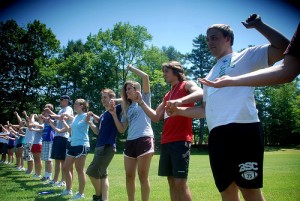 Get ready to build your resume! Working as a camp counselor at a summer camp will provide you with some invaluable experience that will serve you well far beyond this summer. Many HR Managers in lots of different fields find summer camp experience very impressive because of the level of dedication and commitment required. Summer Camp also demonstrates that you can adapt well to new cultures, which is essential for success in many corporate environments. In fact, many corporate executives were once campers and/or camp counselors themselves. If you’re an education major, it goes without saying that experience working directly with children is a huge plus on a new teacher’s resume.
Get ready to build your resume! Working as a camp counselor at a summer camp will provide you with some invaluable experience that will serve you well far beyond this summer. Many HR Managers in lots of different fields find summer camp experience very impressive because of the level of dedication and commitment required. Summer Camp also demonstrates that you can adapt well to new cultures, which is essential for success in many corporate environments. In fact, many corporate executives were once campers and/or camp counselors themselves. If you’re an education major, it goes without saying that experience working directly with children is a huge plus on a new teacher’s resume.
One final warning: As a summer camp counselor, you will act goofy, dress funny, and find yourself doing all sorts of crazy things you’d probably never ordinarily do…and you’ll have a blast while doing them. It’s what summer camp is all about. But what other job can you get where being an expert in painting faces, making signs, inventing outrageous costumes, and acting silly are all just part of your typical workday?
So there you have it! A few suggestions for preparing yourself for a great and successful summer. Have fun!
So You’ve Got a Golden Ticket…Ready, Set, Go Part 2
 We promised a sequel and here it is: Orientation 101…
We promised a sequel and here it is: Orientation 101…
The first thing you should know about the orientation is don’t sweat it. Yes, it’s intense. Yes, it’s a VERY busy week and there is a lot to get done. We know that, by the time months of anticipation for your new summer camp job to start come and you travel (sometimes for hours or even days) to get to the camp and find yourself actually there, even the most staunch start to feel the butterflies. Remember that everyone with whom you come into contact those first few days is probably feeling the same butterflies—even returners who’ve done all of it before. But relax. Orientation is also full of opportunities. Opportunities to learn more about your new surroundings, opportunities to learn more about your summer camp and embrace its traditions, opportunities to learn more about your summer job as a camp counselor, opportunities to change your mindset and grasp expectations, and opportunities to make friends.
Speaking of making friends, be ready to make LOTS of them from all over the world! Sure your summer camp job will only last for a couple of months. 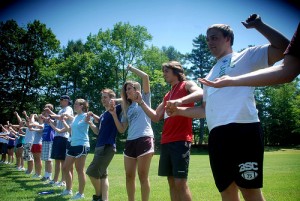 But a couple of months are plenty of time to make lifelong friends when you spend everyday together. You may even find that you don’t need the whole summer to bond. You’ll probably be planning vacations to visit some of your new friends during the winter before orientation is even over.
But a couple of months are plenty of time to make lifelong friends when you spend everyday together. You may even find that you don’t need the whole summer to bond. You’ll probably be planning vacations to visit some of your new friends during the winter before orientation is even over.
Don’t over- or under-pack. Yes, we know that you’re going to want to cram your entire bedroom into your suitcase or duffel.. But the fact is that camp housing isn’t exactly spacious. Most summer camps provide their camp counselors with packing lists. Of course you’re going to want to bring a few personal items, but don’t stray too far from what’s recommended and definitely avoid packing the “DO NOT BRING” items. In other words, make sure your camp permits camp counselors to bring outside  food onto the campus before you pack a stash of Doritos and energy drinks. It’s also a good idea to make sure you read the camps guidelines about permissible items, particularly those related to swimsuits and shoes. Once you’re packed, inspect your suitcase one more time to make sure you remembered things that are often easily overlooked or forgotten by new summer camp counselors, like rain gear or bedding (if your summer camp requires you to bring your own).
food onto the campus before you pack a stash of Doritos and energy drinks. It’s also a good idea to make sure you read the camps guidelines about permissible items, particularly those related to swimsuits and shoes. Once you’re packed, inspect your suitcase one more time to make sure you remembered things that are often easily overlooked or forgotten by new summer camp counselors, like rain gear or bedding (if your summer camp requires you to bring your own).
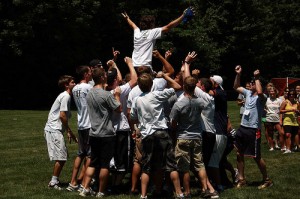 Chances are that you’re going to get a very important email or envelope from your summer camp very soon, if you haven’t already. It’ll have some pretty important paperwork for you to complete. Be sure to pay attention to the specified deadlines for each form. For one thing, you’re not going to want to be bothered with it after you get to camp. For another, not filling it out on time may cause pesky delays in important things…like being paid!
Chances are that you’re going to get a very important email or envelope from your summer camp very soon, if you haven’t already. It’ll have some pretty important paperwork for you to complete. Be sure to pay attention to the specified deadlines for each form. For one thing, you’re not going to want to be bothered with it after you get to camp. For another, not filling it out on time may cause pesky delays in important things…like being paid!
Well that about covers the orientation. We’ve still got enough tips left for you that we’re going to make this one a trilogy. Be sure to come back in a few days for the final part of this series!
So You’ve Got a Golden Ticket…Ready, Set, Go Part 1
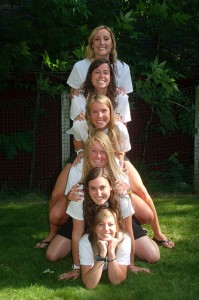 So you’ve gotten a great job at a summer camp and are wondering what to do while you impatiently wait for June to get here…
So you’ve gotten a great job at a summer camp and are wondering what to do while you impatiently wait for June to get here…
First things first. You found this blog, so we’re assuming you want to know as much as you can before you leave. You’ve come to the right place! We’ve got a few suggestions for you…Actually, a lot. In fact, since we understand that you’ve come to this site to read a blog, not War and Peace, we’re going to have to divide this into a few different parts. But we figure that’s okay because they do it with movies all of the time, right? So without any further delay…
Have you started checking out your camp’s blog as well as this one? Many camps now maintain regular blogs and they frequently post blogs (like this one) intended specifically for staff members.
Check out the camp’s website, if you haven’t about a thousand times already. Even if you visit the website everyday 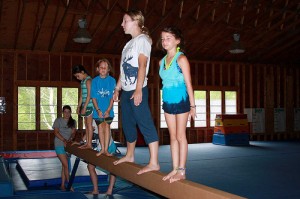 and spend hours staring dreamily at the photos as you imagine images of you having the perfect summer showing up on the site this time next year, dig a little deeper. A camp’s website can also tell you a lot about the very special world that you will be part of this summer. Many camps have FAQ pages for staff members or special staff areas. They give you ideas about what to bring and what to leave at home. Some post sample daily schedules, which are a great way to familiarize yourself with how you will be spending your days. If there are videos on the site (or if the camp sent you one), watch them. Not only will you be ready to leave the same day, but it’s a great way to get to know the camp.
and spend hours staring dreamily at the photos as you imagine images of you having the perfect summer showing up on the site this time next year, dig a little deeper. A camp’s website can also tell you a lot about the very special world that you will be part of this summer. Many camps have FAQ pages for staff members or special staff areas. They give you ideas about what to bring and what to leave at home. Some post sample daily schedules, which are a great way to familiarize yourself with how you will be spending your days. If there are videos on the site (or if the camp sent you one), watch them. Not only will you be ready to leave the same day, but it’s a great way to get to know the camp.
If the camp has Facebook or Twitter pages, join them. They’re another way to keep up to date on what’s happening and, as summer inches closer, the 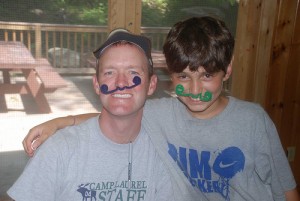 anticipation that builds is infectious. Many camps also post helpful information or instructions for staff members as summer nears. Facebook and Twitter are great ways to connect with other staff members before you get to camp. Not to worry, though. You’ll make PLENTY of new friends during your Orientation, even if you show up knowing no one!
anticipation that builds is infectious. Many camps also post helpful information or instructions for staff members as summer nears. Facebook and Twitter are great ways to connect with other staff members before you get to camp. Not to worry, though. You’ll make PLENTY of new friends during your Orientation, even if you show up knowing no one!
Prepare to work hard. We won’t lie. Camp is one of the hardest jobs you’ll ever have. It’s also one that you’ll probably love the most. Every second of every day, SOMETHING is happening at camp. It’s all a lot to take in at first, but the chances of you making it through the last day at camp without shedding a single tear and hugging hundreds of people are pretty much nil-to-none. And you’ll probably be making plans to come back next summer before this one’s even over.
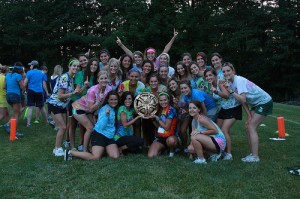 Well, like we said, we’re well aware that if you were looking for a novel, you’d be downloading the latest best seller for you Kindle right now. So we’ll call it a day for this blog. Be sure to tune in next time for advice about what to pack (and not) and some tips for orientation.
Well, like we said, we’re well aware that if you were looking for a novel, you’d be downloading the latest best seller for you Kindle right now. So we’ll call it a day for this blog. Be sure to tune in next time for advice about what to pack (and not) and some tips for orientation.

